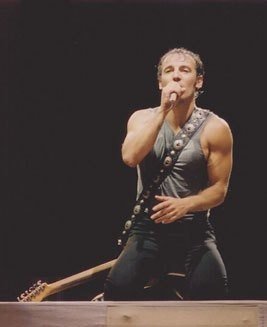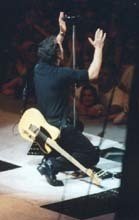
カトリック詩人スプリングスティーン(追記あり)
現代は詩人がロッカーとして(も)現れる。
ブルース・スプリングスティーン論 'The Greatest Catholic Poet of Our Time' (Jim Cullen) を読んだ。ポスト・ディランとしてのスプリングスティーンを論じる人は多くても、このような角度で論じるのはめずらしい。
スプリングスティーンの詩に現れる「わたし」は日本語にするときに「おれ」とする誘惑をおさえるのがむずかしい。私も俺と自称したくなるほどに。彼の声や歌の感じが「おれ」感を濃厚にただよわせる。
しかし日本語への翻訳のことは、とりあえず今は些末な問題だ。カレンのスプリングスティーン論「現代最高のカトリック詩人」は題が大げさと感じられる。ほとんどの人はバカな、の一語で切捨てるだろう。アメリカ人でさえも。
カレンの議論を要約すると、スプリングスティーンは子供の頃から自分の存在意義を神に尋ねつづけた男ということになろうか。彼にとってのテーマは現代の隅々まで浸透した悪と戦うことだ。つまり、一言でいってロックによる宣教師。
両親はロケンロールに反対した。父親は彼に弁護士になれと、母親は作家になれと言った。だが彼はモーセの十戒にはつづきがあると神から聞かされた。第11戒は
let it rock!
だった。「ロックせよ!」かれはこれを信じた。
カレンの議論をただ読むだけでは人は納得しないだろう。何らかの理解ができるとすれば、ブルース・スプリングスティーンの歌を実際に聴き、その詩をじっくり考えたときだけだ。
1982年のアルバム 'Nebraska' に収められた歌 'My Father’s House' は彼の人生を要約するようにも感じられる。歌の最後で彼はこう唄う。
My father’s house shines hard and bright
It stands like a beacon, calling me in the night
Calling and calling, so cold and alone
Shining ’cross this dark highway where our sins lie unatoned
ぼくはこういう詩も取上げて論じてみたいと考えている。もしも英詩のマガジンが購読者を集めることができればだが。英詩の議論はたった4行くらいでもまともに論じれば長大なものになることもあるけれど、英詩の議論はお手軽な知識のようにポンとは出せないからだ。議論そのものは(前提知識があれば)だれにも理解が可能だけれども、議論の材料をならべるのに時間がかかる。
*
[追記 20200116]
Jim Cullen の 'The Greatest Catholic Poet of Our Time' は現在は読めないようだ。Wayback Machine (Intertnet Archive) で2016年3月31日の魚拓が拾えたので、以下に再掲しておく。
*
The Greatest Catholic Poet of Our Time
Jim Cullen
[original URL: https://www.up.edu/portlandmag/2006_spring/boss/boss1.html]
Some people pray, some people play music.
— Bruce Springsteen

One story Bruce Springsteen often told in his early concerts was about how his parents were worried about his fixation with rock and roll, which they felt was no way to make a living. His father, a bus driver, thought he should be a lawyer; his mother, a secretary and homemaker, thought he should become a writer.
“My mother, she’s very Italian,” he told a roaring crowd in Phoenix years ago. “She says, ‘This is a big thing, you should go see a priest.’” Bruce goes to the rectory and talks to Father Ray, but Father Ray says “This is too big a deal for me. You gotta talk to God.’”
Bruce has no idea where to find God, but his sidekick and saxophone player Clarence Clemons does: God lives in a house at the edge of the woods. Bruce and Clarence drive to God’s house. Music blasts through the door of the house as they approach.
“Clarence sent me,” says Bruce to the Lord, who is seated behind a drum set. Springsteen explains his career dilemma.
“There was supposed to be an eleventh commandment,” answers God. “It’s Moses’ fault. He was so scared after ten, he went back down the mountain. You shoulda seen it—great show, the burning bush, thunder, lightning. You see, what those guys didn’t understand was that there was an eleventh commandment...
let it rock!”
It’s helpful to point out what doesn’t happen here: this is not a story in which a young man denies the existence of God, or angrily rejects Him, or is disappointed by what he finds. This is a story about a man who seeks and receives divine approval for doing what he most wants to do. Which is, in effect, to become a missionary. The man whose parents fear he does not want to work ends up doing the most important work of all: God’s work.
The devil appeared like Jesus through the steam in the street
Showin’ me a hand I knew even the cops couldn’t beat
I felt his hot breath on my neck as I dove through the heat
It’s so hard to be a saint when you’re just a boy out on the street
Bruce Springsteen went to Saint Rose of Lima Catholic elementary school in Freehold, New Jersey. He describes his experience, cheerfully, as a disaster. “I spent half of my first thirteen years in a trance... In the third grade a nun stuffed me in a garbage can because, she said, that’s where I belonged...
I also had the distinction of being the only altar boy knocked down by a priest during Mass. The old priest got mad. My mother wanted me to serve Mass, but I didn’t know what I was doin’ so I was trying to fake it...” Throwing in the towel, Springsteen’s parents sent him to the public high school in Freehold. But his Catholicism was deeply rooted. Jesus and Mary and the Holy Ghost figure heavily in his early lyrics, and the 1975 hit “Thunder Road” is rife with Catholic imagery:
You can hide ’neath your covers
And study your pain
Make crosses from your lovers
Throw roses in the rain
Waste your summer praying in vain
For a savior to rise from these streets
Well now I’m no hero
That’s understood
All the redemption I can offer, girl
Is beneath this dirty hood
With a chance to make it good somehow
Hey what else can we do now?
And, by the time of Darkness on the Edge of Town (1978), it is clear that Springsteen has read the Bible very carefully indeed — note the songs “The Promised Land” and “Adam Raised a Cain,” for example:
In the Bible Cain slew Abel
And East of Eden he was cast
You’re born into this life payin’
For the sins of somebody else’s past
But the major turning point in Springsteen’s career is The River (1980), in which his Catholicism is no longer merely a matter of metaphor or humor. The mature artist is now interested in spirituality and hope, resurrection and faith, grace and dignity. Ordinary objects are endowed with sacred intensity, and the ragged, anguished quality of Springsteen’s voice forcefully endows everything with an almost religious aura. And he is now in direct confrontation with the psychological dimensions of sin and human mortality. While the characters of Darkness wrestle with burdensome legacies in the struggle to realize their aspirations, many of those on The River actually lose the fight. In early Springsteen songs, characters respond to such adversity with renewed determination. The truly scary songs of The River are those, especially on the last half of the album, in which individuals realize that they’ve come up against something much larger than they can handle.
But I ride by night
And I travel in fear
That in this darkness
I will disappear
The next step along Springsteen’s spiritual road is the record Nebraska (1982). If the characters of The River veer toward a spiritual abyss, those of this album plunge into it. Nowhere is this clearer than in the title track, whose protagonist (based on Charlie Starkweather, a man who went on a notorious murder rampage in the 1950s) reveals much about the mood of the album. Tried, convicted, and sentenced to death, he is informed that his soul will be hurled into “that great void.” Unlike the characters of “Stolen Car” or “Wreck on the Highway,” however, he receives this news with an almost unnerving lack of affect. Asked why he has committed such monstrous crimes, he offers an explanation that looms over the album as a whole: “Well sir I guess there’s just a meanness in this world.”
The disembodied quality of “meanness” is crucial. At the time of its release during the worst recession since the Great Depression, reviewers of Nebraska wrote a great deal about the political critique embedded in the album. Far less has been said about the religious foundation of that critique, which rests on a confrontation with the problem—and nature—of evil. While some might project their darkest impulses on to a particular group of people (blacks, Jews, immigrants) and others single out more abstract, socially determined institutional forces (inequality, economic dislocation, homophobia), Springsteen posits evil as a force that defies demographic specificity or rational explanation.
And evil is everlasting. This is the message of “My Father’s House,” Springsteen’s most conventionally pious song. An adult son dreams of being lost in the woods with the devil snapping at his heels. He desperately seeks, and finds, his father—only to awaken to a powerful sense of guilt and longing over their broken relationship. Impulsively, he dresses and drives to the house, only to learn he no longer lives there. The concluding verse sounds a collective indictment:
My father’s house shines hard and bright
It stands like a beacon, calling me in the night
Calling and calling, so cold and alone
Shining ’cross this dark highway where our sins lie unatoned
Yet Springsteen suggests that there is a flip side to transcendental sin: “Everything dies baby that’s a fact / But maybe everything that dies some day comes back,” speculates the narrator of “Atlantic City.” If sin permeates every action, so, too, may grace. Or, as the very last song of the record (“Reason to Believe”) has it: “... At the end of every hard earned ay/People find some reason to believe...”

“[The Springsteen album] Tunnel of Love may be a more important Catholic event in this country than the visit of Pope John Paul II,” wrote Father Andrew Greeley in 1988, just after it was released. “The Pope spoke of moral debates using the language of doctrinal propositions that appeal to (or repel) the mind. Springsteen sings of religious realities—sin, temptation, forgiveness, life, death, hope — in images that come (implicitly perhaps) from his Catholic childhood, images that appeal to the whole person, not just the head, and that will be absorbed by far more Americans than those who listened to the Pope ... The piety of these songs—and I challenge you to find a better word—is sentient without being sentimental...”
You’ve got to learn to live with what you can’t rise above
If you want to ride on down through this tunnel of love
This record is filled with Catholic imagery and language, from the straightforward memories of the church bells of his childhood to the words that fill the songs: mercy and love and fear. Tunnel of Love ends with an epiphany, the song “Valentine’s Day,” and the last verse is a rebirth: “I woke up scared and breathin’ and born anew…”
In subsequent records like Human Touch and Lucky Town, Springsteen continued to grapple with the great themes of his work, good and evil, right and wrong, courage and despair, and even as his voice grew sharper (“Now I ply my trade in the land of king dollar / Where you get paid and your silence passes for honor”), he sings life and hope with ever greater power and poetry:
Well now all that’s sure on the boulevard
Is that life is just a house of cards
As fragile as each and every breath
Of this boy sleepin’ in our bed
Tonight let’s lie beneath the eaves
Just a close band of happy thieves
And when that train comes we’ll get on board
And steal what we can from the treasures, treasures of the Lord ...
Bruce Springsteen’s music has been recorded by a number of other artists, and has been used in a number of feature films. But he had never been commissioned to write a song until director Jonathan Demme approached him in 1992 with such a request for Philadelphia, a 1993 film about a man with AIDS who wrongly loses his position with a law firm. Springsteen agreed to see what he could do. The result was “Streets of Philadelphia,” which won Grammy Awards, a 1994 Oscar, and tremendous commercial success. Whatever else this song may be, however, it is also a profound religious statement. “There was a certain spiritual stillness that I wanted to try and capture,” he said.
I was bruised and battered and I couldn’t tell what I felt
I was unrecognizable to myself
I saw my reflection in a window I didn’t know my own face
Oh brother, are you gonna leave me wastin’ away
The song is about faith in human grace, and there is an almost overwhelming longing for transcendence. At the end of it, the irregular beat stops for the only time in the song. It’s as if the narrator is just about to let go. But not yet: He turns his concern outward. In the first verse, he was afraid of being left alone; now, at the end, he wonders if we will leave each other alone. The question is left un-answered as the narrator sings the words “Streets of Philadelphia” for the last time. But the song is not over. It goes on for about another minute. The chanting harmonies and drumbeat gradually fade as the organ increasingly dominates the song. The same phrase — the chord progression is one often used for “Amen” during church hymns — is played repeatedly, rising in steps. Finally, the lower notes fall out as the organ notes peak and disappear: He has risen.
Listening carefully to the music of Bruce Springsteen, one hears an emphasis on egalitarianism; an instinctive compassion; a pragmatic skepticism toward utopian solutions; and, especially recently, a bracing humility about human endeavor — worth emulating in sacred as well as secular life. These are the values of a good conservative. These are the values of a great people.
In the almost 150 years since the Civil War, numerous politicians, artists, activists, and others have called on what Lincoln called our “better angels.” More often than not, such calls have fallen on deaf ears. One might even say that our most notable achievements, ranging from the passage of child labor laws to defeating the Nazis, have cynical explanations. But no nation can function at all without some faith in its intentions, and it is the American faith that the republican democracy of the last 200 years can claim more success than failure, more progress than regress. Honorable people can disagree as to the degree of success or regress, and can disagree as to what exactly constitutes better angels. My own answers to those questions are formulated with the help of a rock and roll singer with little in the way of formal education. It may seem unlikely to think of him in such Lincolnian terms (though Lincoln himself had little in the way of formal education), but it seems to me that part of our American faith is a willingness to look for—and the confidence that we will find—answers to our most important questions in relatively humble quarters.
The value of Bruce Springsteen’s art is not in some vast talent (though he is an unusually talented man), but rather in his acuity in representing the people who populate his songs, people who have foibles and failings, but people who in the end constitute our last best hope for making this society work. At the same time, considered as a whole, Springsteen manifests a series of tendencies—his republicanism, his accommodation of personal and collective failure, his hope for his country, and his belief in something larger than it—which really do reveal better angels that at least coexist with lesser ones.
These tendencies are not Springsteen’s alone; that is precisely why he is important. His art bears a strong resemblance to that of a number of other important figures in our history, from the expressive poetry of Walt Whitman to the humorous prose of Mark Twain. His politics reflect an egalitarian spirit that brings Jefferson’s plowman to FDR’s fireside. His moral fervor resonates with that of Lincoln and Martin Luther King. Springsteen may not be as accomplished as any of these people. But he too, with immense grace and power, embodies common values spread across American society at large.
In January 1993, inaugurating a presidency that was a disappointment to many of us, Bill Clinton told his fellow citizens that “there is nothing wrong with America that can’t be fixed by what’s right with America.” This, it seems to me, is the core of our national creed and the essence of Springsteen’s music. It is the job of a truly great artist to remind us of who we are. When I listen to Bruce Springsteen, I remember how to be an American.
One last Springsteen story. In the immediate aftermath of the September 11 murders, Springsteen was in his car, pulling out of a beach parking lot in the town of Sea Bright, New Jersey, when a man drove by, rolled down his window, and shouted “We need you!” Springsteen went to work. He recorded “Thunder Road” for one victim’s funeral. He helped raise a million dollars for the families of victims in his county. He performed a new song, “My City of Ruins,” for a fundraising telethon. And he began to write and record feverishly.
“I didn’t set out to write a 9/11 album,” he said later. “I didn’t want to write literally about what happened, but [about] the emotions in the air. In the purest sense, that’s what a songwriter does ... [it’s] a secular stations of the cross ...” What this great American storyteller made was the record The Rising, which may well remain the most durable cultural artifact to emerge from the rubble. Incantation, choirs, chants of resurrection, transubstantiation, passion, starkness, references to Buddha and Allah and prophets and the eleven angels of mercy — it is an insistent fusion of joy and sorrow, East and West, life and death. It is a musical tapestry that argues for a kind of diverse unity: e pluribus unum. This Catholic is catholic. Like the very best priests, the work Springsteen has done helps us to keep faith: with ourselves, with our country, with a love that both encompasses and transcends the gift of life.
Jim Cullen is a writer in New York. This essay is drawn from his book Born in the U.S.A.: Bruce Springsteen and the American Tradition (Wesleyan University Press). Our thanks to Suzanna Tamminen and Stephanie Elliott for their prompt & cheerful help. And yes, The Rising is a masterpiece.
この記事が気に入ったらサポートをしてみませんか?
